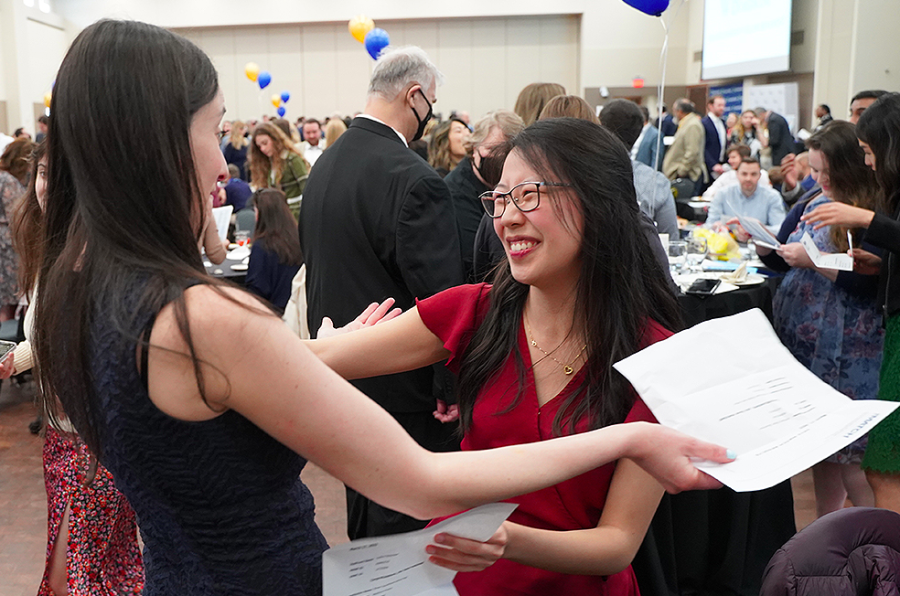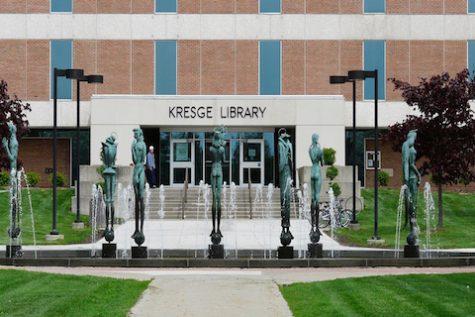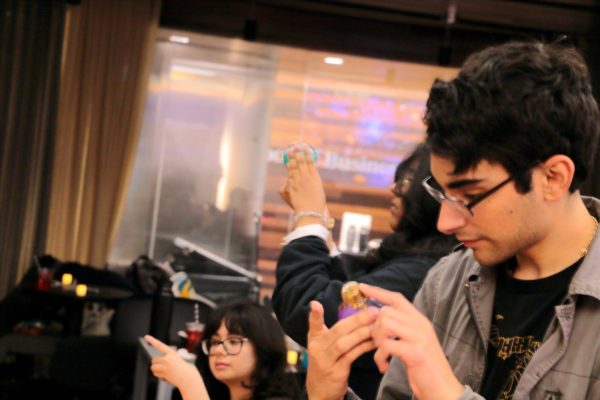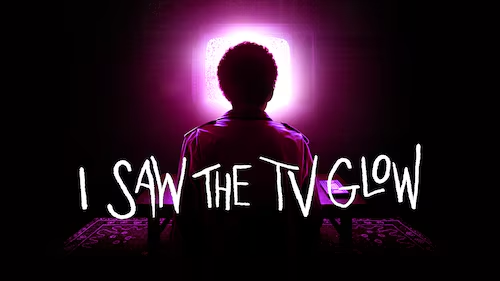OUWB celebrates 2023 Match Day
Brittany Silverman (left) and Kaitlin Pataroque celebrate after learning where they’ve matched.
Every year, on the third Friday of March when the clock strikes noon, thousands of fourth-year medical students across the U.S. open envelopes in unison that contain their entire professional future — where they will train as physicians during their residency for the next several years.
Also known as Match Day, it is considered by many physicians to be one of the most stressful and exciting days of their career. Their fate lies in a single envelope. It is a moment they will never forget.
After graduating from medical school and obtaining a medical degree, physicians are not licensed and thus not permitted to practice independently until they complete a residency program, typically lasting between three and seven years.
In the U.S., residency training was introduced in the early 1900s, but quickly became disorganized and competitive by the 1940s.
To provide structure to the process of placing medical students into residency programs, the National Resident Matching Program (NRMP), also known as The Match, was designed and enacted in 1952 to provide structure to the process of placing medical students into residency programs.
Medical students, using the experiences acquired during clinical rotations in the third year of their education, begin the application process in the fall of their fourth year. Between October and February, programs review the applications they received and invite select applicants for interviews and institution tours.
After the application process is finalized, both applicants and residency program directors create a ranked list in order of preference for either programs or students, respectively. These lists are then submitted to NRMP, which then combines the ranked lists and uses a mathematical algorithm to place applicants into residency programs.
On the third Monday of March, students receive notification from the NRMP if they have matched into a residency program, but have to wait until Friday to learn where.
If an applicant finds out they haven’t been accepted into a residency program, they are eligible to participate in the Supplemental Offer and Acceptance Program (SOAP), a matching process that takes place between Monday and Thursday of Match Week. This provides an opportunity for those that did not match to apply to residency programs with unfilled positions.
It is considered to be a streamlined process. In fact, researchers Lloyd Shapley and Alvin Roth were even awarded the Nobel Prize in economics in 2012 for developing the mathematical algorithm the NRMP uses.
At the Oakland University William Beaumont School of Medicine (OUWB), students gathered on campus to open their envelopes together and commemorate the occasion. Due to the COVID-19 pandemic, this was the first in-person celebration in three years.
Addressing the medical students, guests and campus community, Dr. Ben Shwartz, president of Corewell Health East, compared matching into a residency program to a marriage.
“When you open the envelope and learn where you’re going to train, that place wants you badly,” he said. “It’s almost like a marriage. They’re committing to you in a partnership, and the reason they’re willing to make that commitment to you is because of your expertise in training.”
Dr. Duane Mezwa, OUWB dean, also spoke at the event.
“I commend all of you for the hard work, dedication and determination that brought you to today,” he said. “Think about how far you have come — and be proud.
“Pat yourself on the back for following your dreams. You’re entering the most exciting time of your lives.”
A total of 110 medical students from OUWB’s class of 2023 matched in residency programs across 26 different states, with 45% of students matching in Michigan. Some medical students (20%) will be continuing their training in Corewell Health residency programs in 12 specialties. Forty-two percent of OUWB medical students matched in primary care residencies.
The top five specialties OUWB students matched in include internal medicine (15%), anesthesiology (8%), emergency medicine (8%), psychiatry (8%) and family medicine (5%).
Outside of Michigan, students also matched at locations that include Brown University, Cleveland Clinic, Johns Hopkins University, University of California-Irvine, University of California-Los Angeles and University of Massachusetts T.H. Chan School of Medicine.
While nearly 45% of students will stay in Michigan, California, Ohio, New York, Florida and Illinois were also top states where students matched into programs.
Twelve match day students are also OU undergraduate alumni.
OUWB’s 2023 Match Day percentage was 100%, meaning every medical student in the class of 2023 has a placement for residency. The national average is 93%.
All of the emotions were on full display as students began to open their envelopes for the big reveal. Students cried, cheered each other on and embraced those that have supported them along the way.
Tarek Almsaddi, an OU alumni who matched into interventional radiology, was reflective on his time at the university.
“It’s a full circle experience. I came here for both undergrad and medical school, and now I’m continuing through the affiliation of being at Beaumont-Dearborn,” Almsaddi said. “It’s been the biggest blessing having the same people in my corner, and I’m super appreciative of all of it.”
Kaitlin Pataroque, an M4 who matched in internal medicine, called this moment “special.”
“This moment is really special and is the culmination of all our hard work,” Pataroque said. “I’m face timing my family to let them know where I’m at, so I’m excited for the next three years.
“All of my regions are in different regions of the U.S., so it was exciting to finally figure out where I’m going to be for the next three years of my life.”
She was also reflective on how the COVID-19 pandemic shaped her medical school experience.
“I think it makes it even more sweet that we have this event in person,” Pataroque said. “The pandemic happened in the middle of our first year, so our class was really lucky that we got to build a community during our first year of medical school so that we were still able to support each other. It’s nice to end our time here on campus.”






